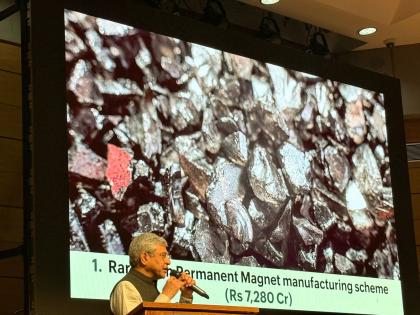India will become Atmanirbhar in rare earth magnets in three-four years: Ashwini Vaishnaw
By ANI | Updated: November 26, 2025 19:10 IST2025-11-26T19:05:49+5:302025-11-26T19:10:22+5:30
New Delhi [India], November 26 : India will become self-reliant in rare earth magnets in three-to-four years, Union Minister ...

India will become Atmanirbhar in rare earth magnets in three-four years: Ashwini Vaishnaw
New Delhi [India], November 26 : India will become self-reliant in rare earth magnets in three-to-four years, Union Minister Ashwini Vaishnaw said on Wednesday, after he announced that the Union Cabinet has approved a Rs 7,280 crore scheme to promote the manufacturing of sintered Rare Earth Permanent Magnets (REPM).
"We will become Atmanirbhar within three-four years, considering that our production capacity would increase," the minister said, responding to media query on when will India will become self-reliant on rare earth magnets.
REPMs are one of the strongest types of permanent magnets and are vital for electric vehicles, renewable energy, electronics, aerospace, and defence applications. The Scheme will support the creation of integrated REPM manufacturing facilities, involving conversion of rare earth oxides to metals, metals to alloys, and alloys to finished REPMs.
Driven by the rapidly growing demand from electric vehicles, renewable energy, industrial applications, and consumer electronics, India's consumption of REPMs is expected to double by 2030 from 2025. At present, India's demand for REPMs is met primarily through imports. With this initiative, India will establish its first ever integrated REPM manufacturing facilities, generating employment, strengthening self-reliance and advancing the nation's commitment to achieve Net Zero by 2070.
The total financial outlay of the scheme is Rs 7280 crore, comprising a sales-linked incentives of Rs. 6450 crore on REPM sales for five (5) years and capital subsidy of Rs.750 crore for setting up an aggregate of 6,000 MTPA of REPM manufacturing facilities.
The scheme envisions allocating the total capacity to five beneficiaries through a global competitive bidding process. Each beneficiary will be allotted up to 1,200 MTPA of capacity.
The total duration of the scheme will be seven years from the date of award, including a two-year gestation period for setting up an integrated REPM manufacturing facility, and five years for incentive disbursement on the sale of REPM.
This initiative by the Government of India is a landmark step towards strengthening the domestic REPM manufacturing ecosystem and enhancing competitiveness in the global markets. By fostering indigenous capabilities in REPM production, the scheme will not only secure the REPM supply chain for domestic industries but also support the nation's Net Zero 2070 commitment. It embodies the Governments unwavering commitment to build a technologically self-reliant, globally competitive, and sustainable industrial base, in line with the vision of Viksit Bharat @2047.
"The entire industry is very enthusiastic about this program, because this will create resilience in manufacturing supply and value chains," Vaishnaw said.
The government expects higher participation from the industry, as was witnessed under the semiconductor chips manufacturing programme, he said, referring to the consultations the Ministry of Heavy Industries had held with various stakeholders.
At present, India fulfils its permanent magnet needs through imports, be it from Japan, China, Australia, among others, he said.
"With today's programme, and its implementation, our import dependence will practically reduce to zero. We will completely become Atmanirbhar in the manufacturing of permanent magnets. We will collaborate with some countries, which include Australia and Japan. There are a few technologies which are common in both semiconductor and permanent magnet manufacturing. There are also a few companies who are common in both the manufacturing," the minister said.
India has among the top three rare-earth reserves in the world, the minister said.
The incentive under REPM would be in the form of both capex and production incentives, the minister said, without getting into specifics.
Both government and private companies will be able to participate in REPM manufacturing, he said.
Companies involved in electronics, steel, and automobile manufacturing showed interest in REPM, Vaishnaw said.
Guidelines for the REPM program will be rolled out rapidly, and its execution too will be fast paced, he said.
On probable locations for the five REPM units, he said it will be decided by the companies.
"REPM is a strategic sector, where we have to be present. Without this sector, manufacturing activities in many sectors may stop," the minister noted.
Disclaimer: This post has been auto-published from an agency feed without any modifications to the text and has not been reviewed by an editor
Open in app